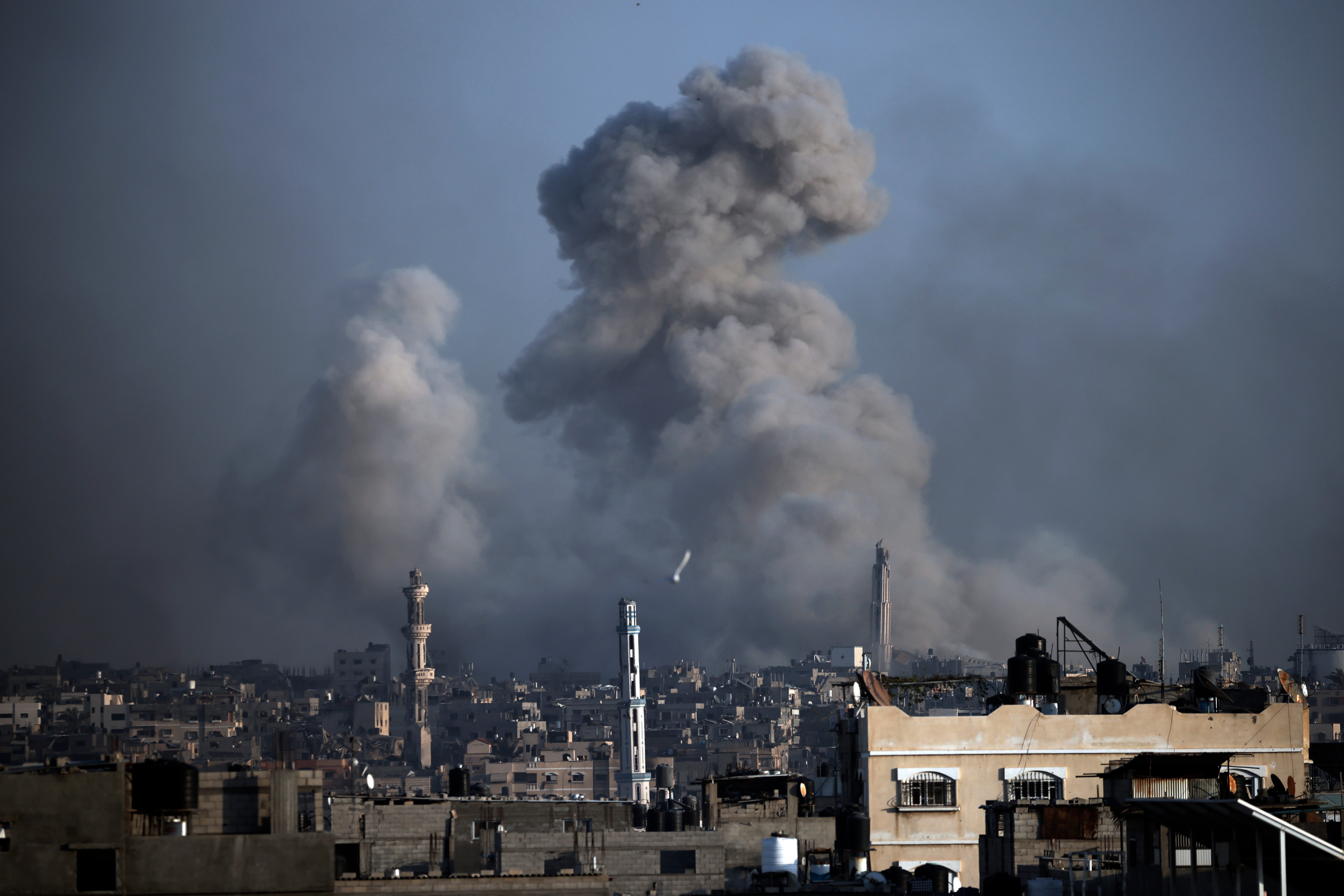Israel’s troops push further south than ever during Gaza war as it steps up strikes
Intense fighting and bombardment in city of Khan Younis comes as Israel conducts raids across occupied West Bank
The Israeli military say troops have pushed further south than ever before during the war in Gaza, with heavy fighting and intense bombardment in the city of Khan Younis.
Israeli defence minister Yoav Gallant said the army was targeting the southern Gazan city of Khan Younis with particular force in order to dismantle the Hamas leadership.
"What is happening in Khan Younis now is complete madness: the occupation bombards the city in all directions, from the air and the ground too," Abu El-Abed, 45, told Reuters. He is now living in Khan Younis after being displaced several times with his family of seven since leaving Gaza City in the north earlier in the war.

The health ministry in Hamas-controlled Gaza said 170 people had been killed in Israeli strikes throughout the territory across the last 24 hours – including 16 in a single strike on a house in the southern city of Rafah, where many people have fled.
The Israel-Hamas war was triggered by Hamas’ shock attack inside southern Israel on 7 October, which saw around 1,200 killed and around 240 taken hostage back into Gaza. In response, Israel has vowed to eradicate Hamas and has launched airstrikes and ground operations inside Gaza, backed up by a blockade. Health officials in Gaza say more than 24,000 people have been killed in the three-month conflict.
It comes as a new wave of violence sweeps across the occupied West Bank, with a series of raids launched across the territory. Israeli forces remained in Tulkarem, in the north of the West Bank, on Thursday afternoon, more than 36 hours after launching a raid on a refugee camp there.
A 27-year-old Palestinian was shot dead by Israeli forces in Tulkarem on Thursday, according to the Palestinian Red Crescent. On Wednesday, five Palestinians were killed inside the same refugee camp, according to the Palestinian health ministry, while Israel's military said that an airstrike had killed "a number of terrorists" during a raid there.
In a separate operation, five Palestinians were killed in an airstrike near the entrance to the Balata refugee camp. The five were with the al-Aqsa Martyrs Brigades, the armed wing of the Palestinian president, Mahmoud Abbas’s, Fatah party – bringing the total killed in the West Bank on Wednesday to 10. Among the dead was Palestinian militant Ahmed Abdullah Abu Shalal, whom the Israeli military said was targeted after they received intelligence "of his cell's intentions of carrying out an imminent terrorist attack". The army said Abu Shalal had been responsible for a "number of terrorist attacks" over the past year.
At least 355 people have been killed by Israeli forces or settlers across the West Bank since 7 October, according to UN statistics. That includes 90 children. Of the 355, 346 were killed by Israeli forces, eight by Israeli settlers and one by either Israeli forces or settlers.
A doctor at the West Bank’s largest hospital in Ramallah, who did not want to be named for security reasons, told The Independent: “Since 7 October, I’ve treated around five patients per week who were directly shot by Israelis.”
On Thursday morning, he treated a 15-year-old child who was shot by Israeli forces, who is expected to survive.
Israel has occupied the West Bank since the Six-Day War of 1967. It is home to about three million Palestinians as well as around 490,000 Israelis, who live in settlements deemed illegal under international law.
The World Health Organisation's Sean Casey, who left Gaza recently after five weeks of trying to get more staff and supplies to the territory's 16 partially-functioning hospitals, told a UN news conference that he saw "a really horrifying situation in the hospitals" as the health system collapsed day by day.
Last week, Mr Casey said, he visited the Nasser medical complex, the main hospital in Khan Younis, which is at 200 per cent of its bed capacity with only 30 per cent of its staff, so "patients are everywhere, in the corridors, on the floor."
"I went to the burn unit where there was one physician caring for 100 burn patients," he said.
Israel has also vowed to return all the hostages remaining in Hamas captivity after more than 100 — mostly women and children — were released during a November ceasefire in exchange for the release of scores of Palestinians imprisoned by Israel.
Family members and supporters were marking the first birthday of Kfir Bibas, the youngest Israeli hostage, in a somber ceremony Thursday in Tel Aviv.
The red-haired infant and his four-year-old brother Ariel were captured along with their mother, Shiri, and their father, Yarden. All four remain in captivity.
Meanwhile, Israeli prime minister Benjamin Netanyahu says he has informed Washington that he opposes the establishment of a Palestinian state as part of any postwar scenario. The US has called on Israel to scale back its offensive and said that the establishment of a Palestinian state should be part of the "day after."
In a televised news conference, Mr Netanyahu vowed to press ahead with the offensive until Israel realises a "decisive victory over Hamas." He also rejected the idea of Palestinian statehood. He said he had relayed his positions to the Americans.
"In any future arrangement – Israel needs security control all territory west of the Jordan," Mr Netanyahu said. "This collides with the idea of sovereignty. What can you do?"
"The prime minister needs to be capable of saying no to our friends," he added.
Reuters and Associated Press contributed to this report
Join our commenting forum
Join thought-provoking conversations, follow other Independent readers and see their replies
Comments
Bookmark popover
Removed from bookmarks